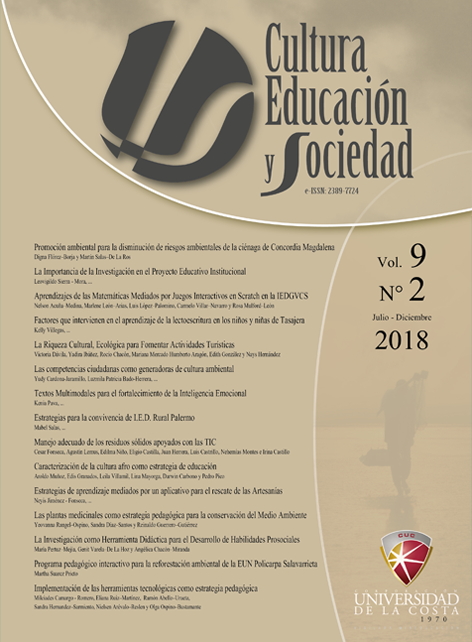Citizen competencies as generators of environmental culture
DOI:
https://doi.org/10.17981/cultedusoc.9.2.2018.06Keywords:
Citizenship competencies; environmental education; conservation of the environment; participationAbstract
Citizen competencies are a component that promotes favorable habits towards the environment, which is why the present study has focused on the strengthening of citizen competencies that allow the conservation of the environment through the promotion of values, such as responsibility, the respect and the sense of belonging to the ecological resources for the improvement of the educational quality, through the transversal processes in the science, technology and innovation areas. The research of quantitative type, of descriptive scope, and the survey was applied as an instrument of information gathering. Within the results it can be said that there is a great motivation on the part of the students to acquire environmental competences, however, activities must continue to be developed under the direction of the teachers and that they should look for the design of strategies to achieve this end.
Downloads
References
Avendaño ,I; CortésO Guerrero H. ( 2015) Competencias sociales y tecnologías de la información y la comunicación como factores asociados al desempeño en estudiantes de básica primaria con experiencia de desplazamiento forzado Diversitas: Perspectivas en Psicología, vol. 11, núm. 1, 2015, pp. 13-36 Universidad Santo Tomás Bogotá, Colombia.http://www.scielo.org.co/pdf/dpp/v11n1/v11n1a02.pdf.
González. C. (2007). Reciclaje: para la protección del ambiente y los recursos naturales. Documento recuperado de: http://www.uprm.edu/taubetapi/library/docs/Presentacion%20Charla%20de%20Reciclaje.pdf
Guerrero. H, Cepeda,M.(2016) Uso de estrategias pedagógicas para el fortalecimiento de la convivencia escolar de jóvenes vulnerables.http://saber.ucv.ve/ojs/index.php/rev_ped/article/view/12501.
López, M., Giraldo, N., & Lopez M. (s.f). Proyecto de Educación ambiental. Documento de revisión recuperado de: http://www.itinelsantuario.edu.co/docs/Proyecto_de_educacion_ambiental__actualizado_1.pdf
Martìnez, J. C., Berthel, Y., & Vergara, M. S. (2017). Síndrome de Burnout en profesores y su relación con el aprendizaje de los estudiantes de básica primaria de una institución educativa oficial de Sincelejo (Colombia), 2016. Revista Salud Uninorte, 33 (2) .118-128. http://dx.doi.org/10.14482/sun.33.2.10538
Martínez, M. (2006). La investigación cualitativa (Vol. 9). (R. d. psicología, Ed.) Lima, Perú. Obtenido de http://revistasinvestigacion.unmsm.edu.pe/index.php/psico/article/view/4033
Meza Botero, M. C., Escallón Largacha, J. E., Rodríguez, C., Moreno Franco, M. F., & Ucrós Pinzón, N. (2011). Orientaciones para la institucionalización de las competencias ciudadanas. (M. d. Nacional, Ed.) Bogotá, Colombia: Amado Impresores S.A.S. Obtenido de http://www.colombiaaprende.edu.co/html/micrositios/1752/articles-314549_recurso_2.pdf
Min-Educación. (2002). Estándares Básicos de competencias ciudadanas. Obtenido de Ministerio de Educación Nacional: https://www.mineducacion.gov.co/1621/articles-116042_archivo_pdf4.pdf.
Novo, M. (2009). La educación ambiental, una genuina educación para el desarrollo sostenible. Revista de Educación. Universidad Nacional de Educación a Distancia (UNED). Madrid, España. Documento recuperado de: http://www.revistaeducacion.mec.es/re2009/re2009_09.pdf
Ortiz, A. (2009). Desarrollo del pensamiento y las competencias báicas congmitivas y comunicativas. Cuba: Litoral. Obtenido de https://www.autoreseditores.com/book_preview/pdf/000000728.pdf?1506924227
PNUMA. (1990). Educación ambiental: modulo para la formación de profesores de ciencias y de supervisores para escuelas secundarias. Orelac. Santiago de Chile. Documento recuperado de: http://unesdoc.unesco.org/images/0007/000714/071480so.pdf
Sauvé, L. (1999). La educación ambiental entre la modernidad y la posmodernidad: En busca de un marco educativo de referencia integrador. Tópicos. Vol. 1. (2). México. Documento digital recuperado de: http://www.ecominga.uqam.ca/PDF/BIBLIOGRAPHIE/GUIDE_LECTURE_1/5/2.Sauve.pdf
Secretaría de Medio Ambiente y recursos naturales. (s.f). Residuos sólidos urbanos: La otra cara de la basura. Documento recuperado de: https://www.gob.mx/cms/uploads/attachment/file/39412/RESIDUOS_SOLIDOS_URBANOS-_ENCARTE.pdf
UNESCO. (2014). Indicadores de cultura para el desarrollo. París, Francia. Obtenido de http://es.unesco.org/creativity/sites/creativity/files/iucd_manual_metodologico_1.pdf
UNICEF. (s.f). Experiencias urbanas de gestión integral de residuos en 10 municipios de Argentina. Documento recuperado de: https://www.unicef.org/argentina/spanish/EcoclubesbajaWEB.pdf.
Downloads
Published
How to Cite
Issue
Section
License
Copyright (c) 2018 CULTURA EDUCACIÓN Y SOCIEDAD

This work is licensed under a Creative Commons Attribution-NonCommercial-NoDerivatives 4.0 International License.
![]()
Creative Commons 2020 CULTURA EDUCACIÓN Y SOCIEDAD
This article is under international license Creative Commons Reconocimiento-NoComercial-SinObrasDerivadas 4.0.
The published articles are the sole responsibility of their authors and do not necessarily reflect the opinions of the editorial committee.
CULTURA EDUCACIÓN Y SOCIEDAD respects the moral rights of its authors, who assign to the editorial committee the patrimonial rights of the published material. In turn, the authors inform that this work is unpublished and has not been previously published.
All articles are under a:
Licencia Creative Commons Atribución-NoComercial-SinDerivadas 4.0 Internacional.
![]()


 English
English
 Español (España)
Español (España)




_12.53_.27_p_. m_._3.png)





_12.57_.35_p_. m_._3.png)
_12.50_.37_p_. m_._3.png)



